Annual Review 2008/09 - Cancer Research UK
Annual Review 2008/09 - Cancer Research UK
Annual Review 2008/09 - Cancer Research UK
You also want an ePaper? Increase the reach of your titles
YUMPU automatically turns print PDFs into web optimized ePapers that Google loves.
Looking to tomorrowOur world-class researchThe past year has seen some promising earlytrial results and the start of many exciting newresearch projects that we hope will lead tothe big breakthroughs of tomorrow.Lung cancer screeningAround 95 people die from lung cancer every day in the <strong>UK</strong>.We know that the earlier the disease is diagnosed, the morelikely it is that a person will survive their cancer. But currently,more than two-thirds of cases in the <strong>UK</strong> are diagnosed at alate stage.We are investigating two new tests for lung cancer in peoplewho are at greatest risk of developing the disease. This couldbe the first step towards a nationwide screening programmethat could save tens of thousands of lives.Seeing the brain betterGlioblastoma is the most common type of brain tumour.Patients are usually treated with surgery, radiotherapy andchemotherapy. Despite the introduction of temozolomide,which was discovered by our scientists and is now recognisedas part of the ‘gold standard’ of care, the disease remainsdifficult to treat in the long term.Our scientists are using the latest and most advanced imagingmethods to see how tumours respond to treatment overtime. They hope to collect information from brain imagesto identify characteristics – or ‘biomarkers’ – that predictregions of the tumour that may return after treatment.This could shape future treatment and improve survivalfor people with this type of cancer.Improving recovery after bowel cancer surgeryAround eight out of ten people with bowel cancer undergosurgery at some point. <strong>Research</strong> has shown that keyholesurgery, in which surgeons make a smaller incision to getinside the body, is as good as conventional surgery fortreating bowel cancer.Our scientists are leading a study to find out whetherkeyhole surgery helps people recover sooner and withfewer complications, such as infection. They are comparingkeyhole and conventional surgery alongside an ‘enhancedrecovery programme’, which they hope will help peoplerecover more quickly.Detecting ovarian cancer earlyOvarian cancer has often spread by the time it is diagnosedand it kills around 4,300 women each year in the <strong>UK</strong>. Aswith most cancers, early detection gives the best chanceof survival. But the disease is difficult to diagnose as thesymptoms can be vague and similar to those of many othermore common conditions.<strong>Cancer</strong> <strong>Research</strong> <strong>UK</strong> is helping to fund a major study oftwo ovarian cancer screening tests to see whether theycould save lives in the future. Initial results are encouraging,suggesting that screening can help detect ovarian cancer early.We await further results from this landmark trial – the largestof its kind – to see whether these tests can form the basis ofa national screening programme.For more on our researchwww.cancerresearchuk.org/cancerandresearch10 / <strong>Annual</strong> <strong>Review</strong> / Looking to tomorrow




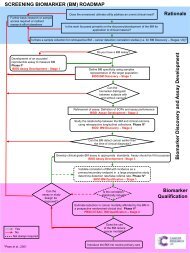
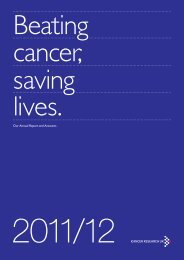
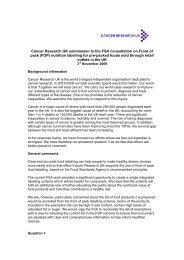
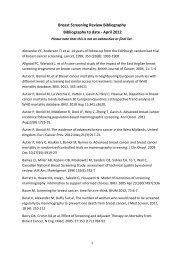
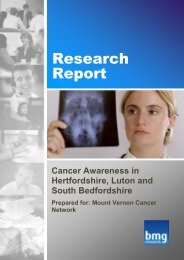




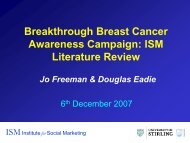
![[PDF] Cancer Research UK's strategy 2009 - 2014](https://img.yumpu.com/29239422/1/184x260/pdf-cancer-research-uks-strategy-2009-2014.jpg?quality=85)

